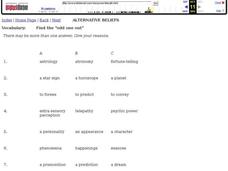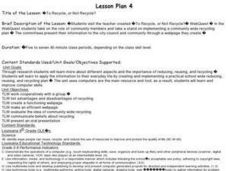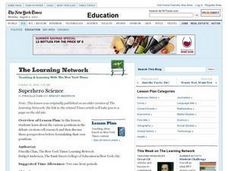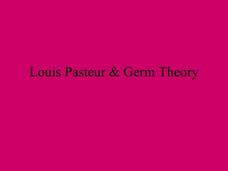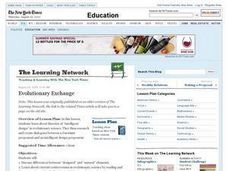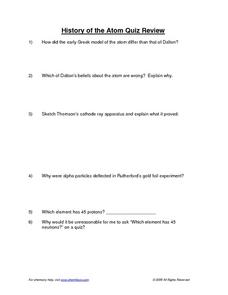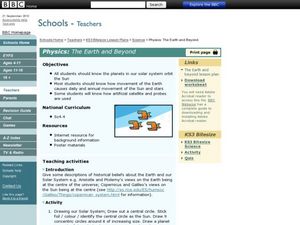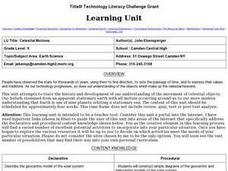Curated OER
Alternative Beliefs--Vocabulary
In this alternative beliefs worksheet, students identify the words or phrases related to alternative beliefs and select the word that does not belong in the category. Students complete 7 exercises.
Curated OER
Theories, Hypothesis, Laws, Facts & Beliefs
In this scientific statements activity, students are given 35 statements and they are to identify if each statement is a fact, law, hypothesis, theory or belief.
Curated OER
Women in Islam
Students examine the beliefs and practices of Islam. In this religion lesson students make comparisons on women's rights throughout history.
Curated OER
Alternative Beliefs--Discussion Questions
In this alternative beliefs worksheet, students read and answer 8 discussion questions about alternative beliefs or aliens.
Mr. E. Science
Our Solar System
The presentation starts with the scientists who made discoveries about our solar system: Ptolemy, Copernicus, Galileo, Brahe, Kepler, and Newton. It also covers the planets, inner, outer, and Pluto, satellites, and an in-depth discussion...
Curated OER
To Recycle, or Not Recycle?
To recycle or not to recycle, that is the question. Your class can find the answer by taking a teacher created WebQuest, where they assume a role of a community member taking a stand on implementing a community wide recycling plan. The...
Curated OER
Superhero Science
Young scientist explore the various positions in the debate on stem cell research and then discuss these perspectives before formulating their own positions. They must research the topic and beliefs that others have. They will also look...
Curated OER
Does Mother Nature Know Best?
Investigate herbal medicine in the science or health classroom with this lesson from the New York Times. After a discussion about class members beliefs about and experiences with herbal medicines, pupils read an article that might...
Curated OER
Galileo: His Times & Beliefs
Students study Galileo and his scientific discoveries. They complete a series of experiments/model constructions, using 17th century equipment and procedures, to "recreate," demonstrate and explore the various discoveries of Galileo.
Curated OER
The Sense of Hearing
Students study the cycle of how we listen and hear our own speech. They examine sound waves, and the role of the nervous system in hearing. They investigate the cues besides lipreading that deaf people rely on for comprehension.
Curated OER
Louis Pasteur & Germ Theory
Germ Theory revolutionized the medical industry and our understanding of bacteria and the human body. Presented is a series of facts and history on Louis Pasteur his discoveries and how they changed beliefs in the scientific community....
Curated OER
The Origin of Life: Alternative Views
Students explore the topics of faith and science as they relate to the origins of life. They consider the major points of Darwin's Theory of Evolution and brainstorm various explanations of how life began. Students investigate different...
Curated OER
Who Ever Heard of the Big Bang?
Learners examine the theories that attempt to explain the origins of the Universe. Some theories are based on scientific facts. Others find their source in folklore. The variety of beliefs systems are discussed as a motivating factor for...
Curated OER
Growing a Seed
Seeing how seeds grow into plants is such an enjoyable for students! They plant lima bean seeds and take pictures to record the growth of their plants. Students write in a journal to describe their daily observations of their plants, and...
Curated OER
Evolutionary Exchange
Young scholars discuss the difference between designed and natural elements. After reading an article, they discover information about current controversies in evolutionary science. In groups, they research and write dialogues between...
Curated OER
Bigger, Faster, Stronger . . . Higher
Students analyze popular feelings and beliefs about two major disasters: the sinking of the Titanic (1912) and the explosion of the Space Shuttle Challenger (1986). They compile evidence, through research and interviews, about how much...
Curated OER
Writing Environmental Laws Refer To Reading Material
Students examine the steps and decisions that are made when drafting an environmental statute. They examine the interplay of opinions, values, beliefs, and science in the development of law. They identify methods to obtain information...
Curated OER
History of the Atom Quiz Review
In this history of the atom worksheet, students answer questions about Thomson's cathode ray apparatus, Rutherford's gold foil experiment and Dalton's beliefs about the atom. Students identify the number of protons, neutrons and...
Curated OER
Physics The Earth and Beyond
Fourth graders will explore our solar system. In this physics activity students create a model of the solar system to explore the movement of Earth, the Sun, and stars.
Curated OER
Celestial Motions
Ninth graders complete a unit of lessons on the history of our knowledge of celestial objects. They conduct Internet research, plot the motion of a planet, construct a model of the sun's apparent motions, and create diagrams of the solar...
Curated OER
Tracking down Good Information on the Web
Fifth graders brainstorm on whiteboard Web authorship and what they think they need to know about information on a website in order to judge its content. They research the solar system websites and present them to the class with their...
Curated OER
Bible (Day 7) Redemption and Caretakers
Whether you are religious or not, humans can be caretakers of the Earth. Students will discuss recycling, how their wasteful actions effect the Earth, and the Alaskan oil spill. They then have small group discussion and write about how...
Core Knowledge Foundation
Genetics and the Master Race
How did the beginnings of genetic research influence the Nazi party? A thorough, engaging unit incorporates the work of Gregor Mendel, the study of inherited traits, and the use of racism and discrimination during the Holocaust.
Curated OER
Alcohol: Separating Fact from Fiction
Learners obtain a clearer understanding of their knowledge about alcohol, recognize that their attitudes, beliefs, & knowledge about alcohol may be different from their peers, and gain experience with scientific methods.
